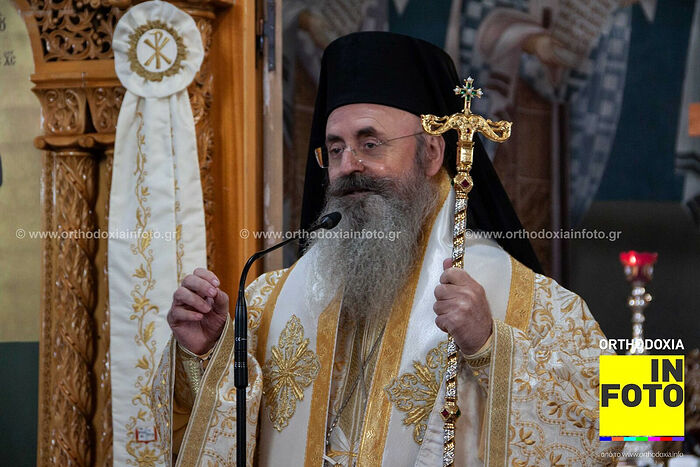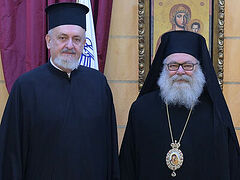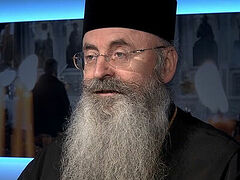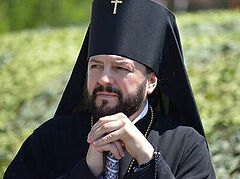Moscow, February 17, 2022
The Russian Church’s Department for External Church Relations has issued a response to the recent interview of Metropolitan Gregory of Peristeri of the Church of Greece, during which he made a number of accusations against the Russian Church and proposed depriving it of autocephaly for five years as punishment for its activity on the territory of the Alexandrian Patriarchate.
Met. Gregory’s claim that the Russian Church has been preparing to invade other Local Churches for 30 years already, and that such ambitions are even to be found in its statutes, are “false and slanderous accusations,” the DECR responds.
The Moscow Patriarchate’s statutes are publicly available, and clearly list the countries that are part of its canonical territory. “Had the Metropolitan of Peristeri bothered to acquaint himself with the statutes of the Russian Church,” he would known this, and would have seen that the Russian Church makes no claim to being the Church for all Russians around the world, wherever they live.
“The Russian Church is in communion with the fullness of the Orthodox Church, she respects the boundaries of the Local Orthodox Churches that have not sullied themselves by communing and concelebrating with schismatics and maintains communion with these Churches,” the Russian Church Department continues.
The suspension of communion with Local Churches and hierarchs who are in communion with schismatics is based on canons that forbid ecclesiastical communion with the excommunicated, the statement explains.
Further, there are no examples of a pan-Orthodox council depriving a Church of autocephaly—when this happened in history, it was done by a secular authority based on secular legislation. Such a decision certainly couldn’t be made by a “Council of the Pentarchy,” as Met. Gregory proposes, especially considering that the theory of the Pentarchy from the 6th-8th centuries was never universally recognized throughout Christendom, according to the DECR.
In its time, the idea of the Pentarchy was the equality of all Local Churches as a counterweight to the papism of Rome and the “ambitions of the iconoclastic Patriarchs of Constantinople.” It’s sad that Met. Gregory is now invoking the idea precisely to “nullify the equality of the Local Orthodox Churches in favor of the latest papal ambitions of the Church of Constantinople.”
The Russian Church has always respected and greatly supported the Eastern Patriarchates, and its move into Africa “is not an expression of claims to the canonical territory of the ancient Church of Alexandria, but pursues the sole aim of providing canonical protection to those Orthodox clerics in Africa who do not wish to participate in the lawless legitimization of the schism in Ukraine,” the DECR explains.
Interestingly, Met. Gregory refers to the Great Schism as simply a “rupture of communion between the two Patriarchates,” but accuses the Russian Church of schisming in the 15th century when it left the Patriarchate of Constantinople for falling into the heresy of uniatism. Not even the Patriarchate of Constantinople historically accused the Russian Church of schisming, the DECR reminds.
Met. Gregory’s contention that the granting of Patriarchal status to the Russian Church in 1593 and the granting of “autocephaly” to the “Orthodox Church of Ukraine” in 2019 are practically identical events is scandalous and groundless, the DECR explains. In fact, the Russian Church’s autocephaly was granted in council by all the Eastern Patriarchs, whereas Patriarch Bartholomew acted unilaterally, and even against the wishes of the other Local Churches when creating the OCU and granting it “autocephaly.”
Met. Gregory proposes a tiered system of autocephalies, and a division between “urban Patriarchates” and “provincial Patriarchates.” However, no such division exists in the canonical tradition, and the Holy and Great Council of 1593 that conferred Patriarchal status upon the Russian Church explicitly says of the Russian Patriarch: “He shall also be called a brother of the Orthodox Patriarchs by virtue of his title, in rank and dignity co-equal.”
The Greek Metropolitan’s proposal that the Cypriot Church be made the fifth in the Pentarchy directly contradicts “the universally recognized decision of the Orthodox Church, and can only be explained as an acute need to find political allies.”
Despite the Metropolitan’s assertion that only the “most ancient” Local Churches can grant autocephaly, there is no fixed procedure in canon law. A procedure was worked in pan-Orthodox gatherings in 1993 and 2009, but Patriarch Bartholomew renounced these agreements when he unilaterally acted in Ukraine.
While Met. Gregory claims Russian autocephaly came with necessary conditions and can be rescinded if the conditions aren’t met, the DECR responds that the granting of autocephaly or Patriarchal status “is an unconditional act and cannot be restricted or recalled.” The canonical territory of all Patriarchates has changed over time and isn’t limited to the territory of any particular country.
The current leadership of Constantinople is self-servingly attempting to radically reinterpret centuries-old decisions and understandings, and its actions in Ukraine have seriously damaged “the unity of the common theological understanding of fundamental canonical and ecclesiological principles.” Constantinople’s experiments in theology and ecclesiology are “rooted … solely in political ambitions.”
Met. Gregory’s proposed system of first and second-class Churches “has the appearance of a wretched and canonically worthless demagoguery aimed at justifying the acts of the Patriarchate of Constantinople in legitimizing the Ukrainian schism, the erroneous nature of which becomes more evident with each passing year,” the DECR concludes.
Follow OrthoChristian on Facebook, Twitter, Vkontakte, Telegram, WhatsApp, MeWe, and Gab!





